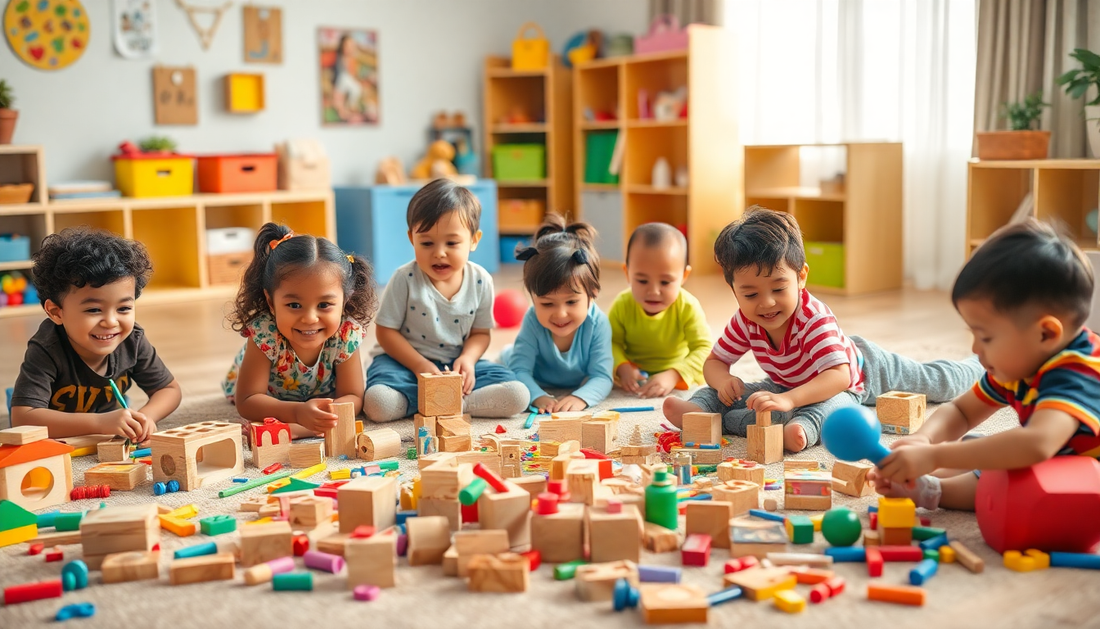
Unlocking the Power of Play: How Toys Nurture Child Development
Share
In the ever-evolving world of childhood, toys have long been the unsung heroes, quietly shaping the minds and futures of our little ones. As parents, caregivers, and educators, we often underestimate the profound impact that these seemingly simple playthings can have on a child's cognitive, social, and emotional development. However, the truth is that toys are not just sources of entertainment – they are powerful tools that can unlock a world of learning, growth, and self-discovery.
The Importance of Play in Child Development
Play is the natural language of childhood, a universal medium through which children explore, experiment, and make sense of the world around them. Through play, children develop essential skills that lay the foundation for their future success. From problem-solving and critical thinking to empathy and self-regulation, the benefits of play are far-reaching and well-documented.
Toys, in turn, are the catalysts that ignite this innate desire to play. They provide the physical and mental stimuli that challenge children, encourage them to think creatively, and foster a deeper understanding of their environment. Whether it's a simple building block or a complex interactive toy, each plaything offers a unique opportunity for learning and growth.
The Benefits of Toys for Children
As children engage with toys, they unlock a world of cognitive, social, and emotional benefits that shape their development in profound ways. Let's explore some of the key advantages that toys can provide:
Cognitive Development
Toys that encourage problem-solving, critical thinking, and spatial awareness can significantly enhance a child's cognitive abilities. From puzzles and shape sorters to STEM-focused toys, these playthings stimulate the brain, promoting the development of essential skills like memory, attention, and logical reasoning.
Social Skills Enhancement
Toys that facilitate cooperative play, such as board games or role-playing sets, help children develop important social skills. Through these interactions, they learn to share, negotiate, and communicate effectively with their peers, laying the groundwork for healthy social relationships.
Motor Skill Improvement
Fine and gross motor skills are crucial for a child's physical development, and toys can play a vital role in honing these abilities. From building blocks to sports equipment, toys that require manipulation, coordination, and movement help children refine their motor skills, laying the foundation for future physical competence.
Emotional Intelligence Growth
Toys that encourage imaginative play, such as dolls or stuffed animals, can foster the development of emotional intelligence. Through these playful interactions, children learn to recognize and express their own emotions, as well as empathize with the feelings of others.
Selecting the Right Toys for Your Child
With so many toys available on the market, it can be overwhelming for parents and caregivers to choose the right ones for their children. When selecting toys, it's important to consider the child's age, developmental stage, and individual interests and abilities. Additionally, safety should always be a top priority, ensuring that the toys are age-appropriate and free from any potential hazards.
Age-Appropriate Toys
Infants, toddlers, preschoolers, and early school-age children all have unique developmental needs that require different types of toys. Choosing toys that are tailored to a child's age and stage of development can maximize the learning and growth potential of playtime.
Learning-Focused Toys
While toys can be sources of pure enjoyment, it's also important to consider their educational value. Toys that promote cognitive, social, and emotional development, such as puzzles, board games, and creative arts supplies, can help children acquire essential skills while they play.
STEM Toys
In today's rapidly evolving world, STEM (Science, Technology, Engineering, and Mathematics) toys have become increasingly popular. These playthings encourage children to explore concepts related to these disciplines, fostering critical thinking, problem-solving, and a love for learning.
Creative and Imaginative Play Toys
Toys that stimulate creativity and imagination, such as dress-up clothes, art supplies, and open-ended building sets, allow children to explore their inner worlds and develop their self-expression.
Learning Through Play
The true power of toys lies in their ability to transform playtime into a purposeful learning experience. By engaging with toys, children don't just have fun – they also develop essential skills that will serve them well throughout their lives.
Interactive Play Strategies
Parents and caregivers can further enhance the learning potential of toys by actively engaging with children during playtime. By asking questions, offering guidance, and encouraging exploration, adults can help children make the most of their toy-based experiences.
Long-Term Benefits of Purposeful Play
The benefits of toy-based learning extend far beyond the immediate playtime. Children who have access to a diverse range of toys and engage in purposeful play tend to exhibit stronger cognitive abilities, better social skills, and higher levels of emotional intelligence – all of which contribute to their overall success and well-being.
Conclusion
Toys are not just sources of entertainment – they are powerful tools that can unlock a world of learning, growth, and self-discovery for children. By understanding the profound impact that toys can have on a child's development, parents, caregivers, and educators can make informed choices that support the holistic growth and well-being of the little ones in their care.
So, let's embrace the power of play and the transformative potential of toys. By nurturing a love for learning through purposeful playtime, we can empower our children to become confident, well-rounded individuals, ready to take on the challenges of the future.
